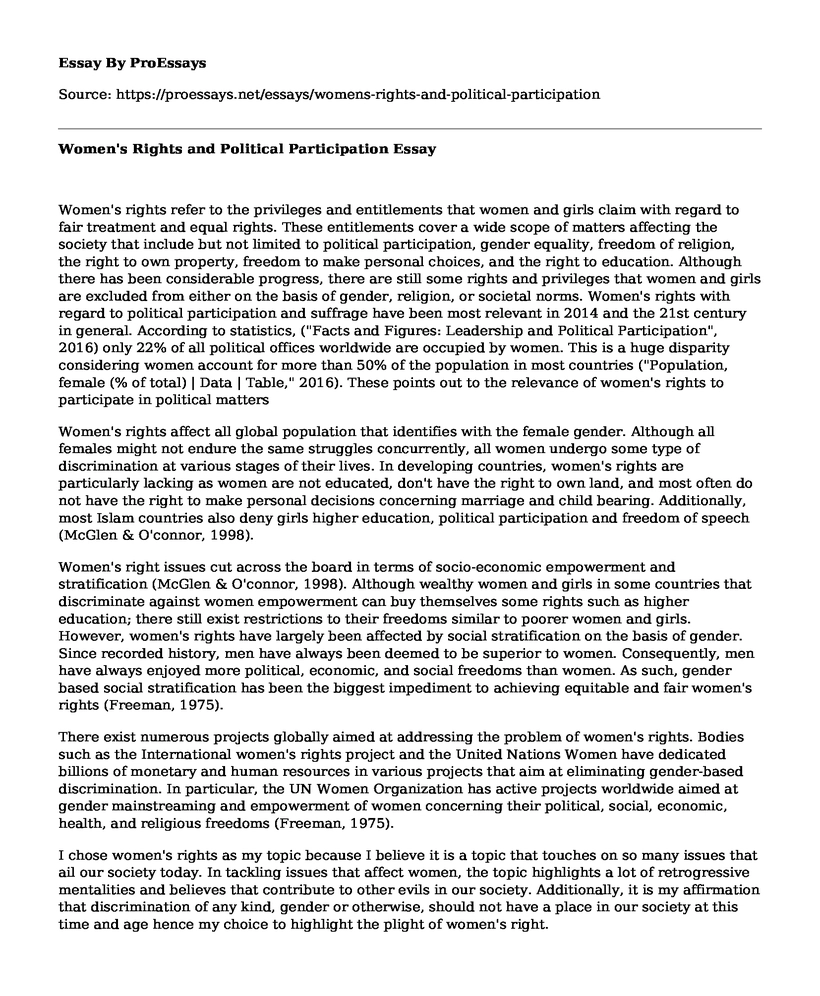Women's rights refer to the privileges and entitlements that women and girls claim with regard to fair treatment and equal rights. These entitlements cover a wide scope of matters affecting the society that include but not limited to political participation, gender equality, freedom of religion, the right to own property, freedom to make personal choices, and the right to education. Although there has been considerable progress, there are still some rights and privileges that women and girls are excluded from either on the basis of gender, religion, or societal norms. Women's rights with regard to political participation and suffrage have been most relevant in 2014 and the 21st century in general. According to statistics, ("Facts and Figures: Leadership and Political Participation", 2016) only 22% of all political offices worldwide are occupied by women. This is a huge disparity considering women account for more than 50% of the population in most countries ("Population, female (% of total) | Data | Table," 2016). These points out to the relevance of women's rights to participate in political matters
Women's rights affect all global population that identifies with the female gender. Although all females might not endure the same struggles concurrently, all women undergo some type of discrimination at various stages of their lives. In developing countries, women's rights are particularly lacking as women are not educated, don't have the right to own land, and most often do not have the right to make personal decisions concerning marriage and child bearing. Additionally, most Islam countries also deny girls higher education, political participation and freedom of speech (McGlen & O'connor, 1998).
Women's right issues cut across the board in terms of socio-economic empowerment and stratification (McGlen & O'connor, 1998). Although wealthy women and girls in some countries that discriminate against women empowerment can buy themselves some rights such as higher education; there still exist restrictions to their freedoms similar to poorer women and girls. However, women's rights have largely been affected by social stratification on the basis of gender. Since recorded history, men have always been deemed to be superior to women. Consequently, men have always enjoyed more political, economic, and social freedoms than women. As such, gender based social stratification has been the biggest impediment to achieving equitable and fair women's rights (Freeman, 1975).
There exist numerous projects globally aimed at addressing the problem of women's rights. Bodies such as the International women's rights project and the United Nations Women have dedicated billions of monetary and human resources in various projects that aim at eliminating gender-based discrimination. In particular, the UN Women Organization has active projects worldwide aimed at gender mainstreaming and empowerment of women concerning their political, social, economic, health, and religious freedoms (Freeman, 1975).
I chose women's rights as my topic because I believe it is a topic that touches on so many issues that ail our society today. In tackling issues that affect women, the topic highlights a lot of retrogressive mentalities and believes that contribute to other evils in our society. Additionally, it is my affirmation that discrimination of any kind, gender or otherwise, should not have a place in our society at this time and age hence my choice to highlight the plight of women's right.
Learning the topic has changed my perspective on a lot of things. Particularly, I have had a change in perspective with regard to discrimination. Initially, I did not realize the extent to which discrimination can negatively affect people. Studying women's rights has helped me put into perspective the extent to which retrogressive beliefs can have an impact on a country and society as a whole.
References
Facts and Figures: Leadership and Political Participation. (2016). Headquarters. Retrieved 13 May 2016, from http://www.unwomen.org/en/what-we-do/leadership-and-political-participation/facts-and-figuresFreeman, J. (1975). The Politics of Women's Liberation A Case Study of an Emerging Social Movement and its Relation to the Policy Process.
McGlen, N. E., & O'connor, K. (1998). Women, politics, and American society. Prentice Hall.
Population, female (% of total) | Data | Table. (2016). Data.worldbank.org. Retrieved 13 May 2016, from http://data.worldbank.org/indicator/SP.POP.TOTL.FE.ZS
Cite this page
Women's Rights and Political Participation. (2021, May 14). Retrieved from https://proessays.net/essays/womens-rights-and-political-participation
If you are the original author of this essay and no longer wish to have it published on the ProEssays website, please click below to request its removal:
- Compare and Contrast Mao Zedong and Kim Jong Un's Method of Enforcement
- Feminine Identity Essay Example
- Legislation Protecting Minority Groups and Women Essay
- Should Citizens be Required to Pass a Voter-Competency Before Casting Their Ballot?
- Facing the Pain of Violence and Crime: A Community Struggle - Essay Sample
- Essay Example on Gerald Boston: A Gay Man's Ten-Year Journey of Discrimination
- Essay Sample on Childhood Obesity: A Growing Pandemic in Need of Solutions







